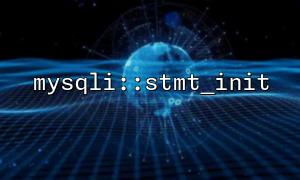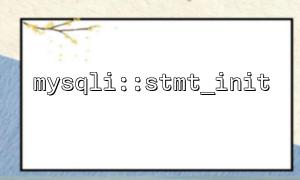In PHP development, database interaction is an inevitable part. Many beginners and even some senior developers are still accustomed to building SQL statements through string splicing. Although this method is simple and intuitive, it has many hidden dangers in terms of safety, maintainability and performance. This article will explore why using mysqli::stmt_init (or a more broadly preprocessing statement) is a safer and more efficient choice, and combines actual cases to demonstrate its application value in development.
Traditional SQL stitching methods are usually as follows:
$user_id = $_GET['id'];
$query = "SELECT * FROM users WHERE id = $user_id";
$result = mysqli_query($conn, $query);
If $user_id has not been strictly verified and filtered, an attacker can easily construct inputs such as 1 OR 1=1 , and then bypass verification, access or even modify sensitive data in the database. This attack method, namely SQL injection , is one of the most common and dangerous security vulnerabilities.
Creating and using preprocessing statements using mysqli::stmt_init can effectively prevent SQL injection. Preprocessing statements separate the SQL statement structure from parameter data, and parameter data will not be parsed into SQL instructions, which fundamentally eliminates the possibility of injection:
$conn = new mysqli("localhost", "user", "password", "database");
$stmt = $conn->stmt_init();
$stmt->prepare("SELECT * FROM users WHERE id = ?");
$stmt->bind_param("i", $user_id);
$user_id = $_GET['id'];
$stmt->execute();
$result = $stmt->get_result();
while ($row = $result->fetch_assoc()) {
echo $row['username'] . "<br>";
}
In this example, ? is a placeholder, bind_param specifies the data type of the variable and binds the variable value. This approach is not only safe, but also makes the code clearer.
Although splicing SQL is shorter than preprocessing statements at the syntax level, preprocessing statements have higher execution efficiency from the database execution level.
When an SQL is executed multiple times (such as inserting multiple records in a loop), the database can compile and cache preprocessing statements, thereby reducing duplicate compilation and parsing time and improving overall performance.
$stmt = $conn->stmt_init();
$stmt->prepare("INSERT INTO logs (message, created_at) VALUES (?, ?)");
$stmt->bind_param("ss", $message, $created_at);
foreach ($logs as $log) {
$message = $log['msg'];
$created_at = $log['time'];
$stmt->execute();
}
In contrast, if you use splicing statements, the database needs to re-parse and compile SQL every time, thus wasting resources.
When the project is complex to a certain extent, there will be more and more variables and data types in SQL statements. Using stmt_init and its supporting methods can make parameter binding and variable separation more intuitive, and more convenient for debugging and maintenance.
In addition, when using preprocessing statements, the parameter data type must be explicitly passed to bind_param , which can reduce errors caused by inconsistent data types to a certain extent and improve the robustness of the code.
In actual projects, the URL is the main entry for parameter input, for example:
https://m66.net/user.php?id=1
If this type of URL is spliced directly into SQL through $_GET['id'] , it is very easy to become an attack point. The preprocessing statement ensures that even if the attacker enters something similar:
https://m66.net/user.php?id=1 OR 1=1
The system can still correctly recognize the entire input as a string parameter without being executed as a SQL instruction by the database, fundamentally protecting the system security.
In PHP project development, choosing the correct database interaction method is crucial to the security, stability and performance of the system. Although mysqli::stmt_init and preprocessing statements may seem a bit cumbersome at first, the security advantages and performance improvements it brings are indispensable guarantees for any serious development project.
Instead of making up for the loss afterwards, it is better to lay a solid foundation from the beginning - abandon splicing SQL and embrace preprocessing statements to make the code safer, more efficient and reliable.
Related Tags:
SQL














